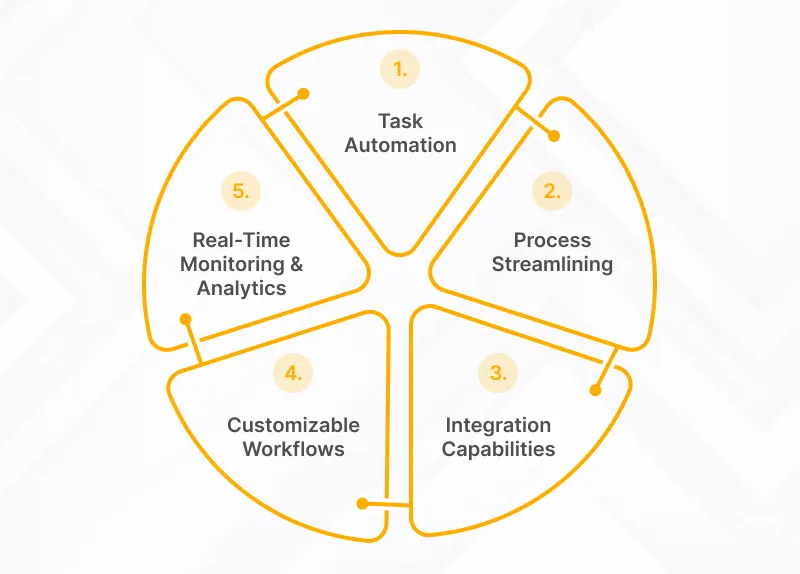Whether you are a startup owner or a large enterprise CEO, finding ways to streamline your business workflow can all make a huge difference in your business productivity & profitability.
Many businesses are switching to task automation software to deliver quick & accurate results.
These workflow automation tools streamline workflows, save valuable time, and significantly increase productivity. This allows software teams to focus on more strategic tasks.
Continue reading this blog if you want to explore the top workflow automation tools for your business. You will also find specific examples that have proven to be game-changers in the software development industry.
An Overview of Workflow Automation Tools
Workflow automation tools are software applications designed to automate repetitive tasks, streamline processes, and enhance overall productivity.
These tools help businesses by reducing the manual effort required to complete routine tasks. Here is an overview of what workflow automation tools offer:
1. Task Automation: Automate routine tasks viz. data entry, email responses, and social media posting. This reduces the time spent on mundane activities.
2. Process Streamlining: Simplify complex workflows by automating multi-step processes. This ensures consistency & reduces the chances of errors.
3. Integration Capabilities: Connect various software applications and services to create a cohesive workflow. Integration platform as a service (IPaaS) allows different tools to communicate and work together seamlessly.
4. Customizable Workflows: Design workflows that fit specific needs. Customization ensures that the tool adapts to your unique processes and not the other way around.
5. Real-Time Monitoring & Analytics: Track the progress of automated tasks and workflows in real-time. Analytics provide insights into performance and areas for improvement.
Discover our best automation tools tailored for your business.
Top Reasons To Use Workflow Automation Tools
Workflow automation tools not only streamline operations but also enhance overall efficiency and effectiveness by addressing these common issues. Implementing these tools lead to a more productive workforce, improved customer relationships etc.
-
Saves Effort & Time on Redundant Tasks
Whether it is data entry, invoice processing, or routine email follow-ups, these activities can drain productivity. Workflow automation toolshandle these tasks efficiently, thus, freeing up time for you to focus on more strategic & creative work.
-
Enhance Customer Engagement
Automation tools ensure that customer inquiries and interactions are managed promptly and consistently. Automated responses, follow-ups, and updates can enhance customer satisfaction & engagement that leads to better retention and loyalty.
-
Reduce Load on Top Management
Top management often spends excessive time on administrative and operational tasks, diverting their focus from strategic planning and decision-making. These tools reduce the operational burden on executives and allow them to concentrate on driving business growth and innovation.
-
Complete Accountability
Workflow automation tools provide clear visibility into task assignments, progress, and deadlines. This transparency ensures that everyone knows their responsibilities and can be held accountable for their contributions.
-
Better Communication
Automation tools in software development facilitate better communication by keeping everyone informed about the status of tasks & projects. Notifications, reminders, and updates ensure that team members are always on the same page. For businesses in the HVAC sector, having efficient management tools is essential for productivity. Exploring a robust HVAC field service software can drastically improve how you oversee dispatch, scheduling, and customer operations. These features align with the top reasons to use workflow automation tools.
Streamline your processes with our cutting-edge automation tools.
List of Workflow Automation Tools
Have a look at the sorted list of top work process automation tools for your business:
1. Project Management Automation Tools
Efficient project management involves planning, executing, and monitoring projects to ensure they are completed on time and within budget. Project management tools include:
- Trello
Trello uses a card-based system to organize tasks and projects. It offers customizable boards, lists, and cards, as well as integrations with other tools like Slack, Google Drive, and Evernote.
It’s visual interface makes it easy to manage tasks and track progress. It is highly flexible, allowing teams to tailor it to their specific workflow.
Key Points
- Ideal for small to medium-sized teams who are managing simple to moderately complex projects.
- Used extensively for content planning, product development, and event planning.
- Asana
Asana offers task management, project timelines, workflow automation, and collaboration tools. It integrates with a variety of apps including Slack, Microsoft Teams, and Zoom.
It’s robust features make it a powerful tool for managing complex projects. It improves accountability by clearly defining tasks and deadlines.
Key Points
- Suitable for teams of all sizes managing complex projects across various industries.
- Commonly used for marketing campaigns, product launches, and strategic planning.
- Jira
Jira is designed for agile project management. It offers features such as sprint planning, issue tracking, and customizable workflows. It also integrates with development tools like GitHub and Bitbucket.
Jira is highly customizable and powerful, making it ideal for software development projects. It supports agile methodologies like Scrum and Kanban.
Key Points
- Primarily used by software development teams for bug tracking, sprint planning, and product development.
- Also used in IT and project management across various sectors.
2. Communication & Collaboration Tools
Having the right tools to facilitate seamless interaction is more important than ever. Communication tools enable team members to share information, collaborate in real-time, and maintain productivity regardless of their physical location. This includes:
- Slack
Slack offers organized channels for team communication, direct messaging, file sharing, and integration with numerous other tools like Google Drive, Trello, and Zoom. It also supports voice and video calls.
Slack’s intuitive interface and robust features make it easy for teams to stay connected & collaborate efficiently. Its integration capabilities allow for a centralized communication hub.
Key Points
- Used by teams of all sizes for project communication, brainstorming sessions, and quick updates.
- Ideal for remote teams needing a reliable platform for day-to-day interactions.
- Microsoft Teams
Microsoft Teams provides chat, video conferencing, file sharing, and collaboration tools integrated with Microsoft Office 365. It includes features like meeting scheduling, screen sharing, and team channels.
Microsoft power automate development offers solutions for communication & collaboration, especially for organizations already using Microsoft products. It increase productivity with its deep integration with Office 365.
Key Points
- Widely used in corporate environments for team meetings, project collaboration, and integration with other Microsoft services.
- Suitable for both small teams and large enterprises.
- Zoom
Zoom is known for its high-quality video conferencing, webinars, and screen-sharing capabilities. It offers features viz. virtual backgrounds, breakout rooms, and meeting recordings.
Its user-friendly interface & reliable performance make it a go-to tool for virtual meetings & webinars. It supports big group meetings, thus, making it ideal for training sessions & online events.
Key Points
- Perfect for remote meetings, virtual conferences, and webinars.
- Frequently used by businesses for team check-ins, client meetings, and educational institutions for online classes.
3. Marketing Automation Tools
Marketing automation helps in automating repetitive marketing tasks, viz. social media posting, email campaigns, and lead nurturing. Top tools include:
- HubSpot
HubSpot provides a comprehensive suite of marketing tools that include social media management, email marketing, and CRM integration. It also offers robust analytics & reporting features to track the performance of marketing campaigns.
It is all-in-one platform that simplifies marketing operations. It also enables businesses to manage their marketing strategy from a single dashboard. It helps in creating personalized marketing campaigns and improving lead management.
Key Points
- Companies use HubSpot to manage social media content, automate their email marketing campaigns, and nurture leads through targeted workflows.
- Mailchimp
Mailchimp is known for its user-friendly interface and powerful email marketing capabilities. It includes features like customizable email templates, audience segmentation, and detailed analytics.
Mailchimp helps businesses to create & send professional email campaigns, track their performance, and understand their audience better. It provides integrations with various e-commerce platforms and CRM systems.
Key Points
- Businesses use Mailchimp to automate their email campaigns, segment their audience for targeted marketing, and analyze campaign performance to optimize their strategies.
- Marketo
Marketo offers advanced marketing automation features, including lead management, email marketing, and analytics. It also provides tools for account-based marketing and personalized web content.
Marketo’s robust automation capabilities help businesses streamline their marketing processes, improve lead nurturing, and enhance customer engagement. Its detailed analytics provide insights into campaign effectiveness and ROI.
Key Points
- Companies use Marketo to automate complex marketing workflows, manage and nurture leads, and deliver personalized content to their audience.
4. Sales Automation Tools
Sales automation tools are designed to streamline & enhance the sales process by improving overall sales efficiency, by automating repetitive tasks, and managing leads. These tools help sales teams focus on building relationships and closing deals. The top tools include:
- Salesforce
Salesforce is a comprehensive CRM platform that offers lead and contact management, opportunity tracking, workflow automation, and integration with various third-party applications. It also includes advanced analytics and reporting tools.
Its robust feature set enables sales teams to manage their pipelines effectively, automate routine tasks, and gain valuable insights into their sales performance.
Key Points
- Ideal for managing large sales teams, tracking customer interactions, and creating customized sales reports.
- Frequently used by enterprises to automate complex sales processes and improve customer relationship management.
- Pipedrive
Pipedrive focuses on pipeline management with features like visual sales pipelines, customizable stages, activity reminders, and email integration. It also offers reporting & analytics to track sales performance.
Pipedrive’s intuitive interface and visual pipeline make it easy for sales teams to manage their deals and stay organized. The tool’s simplicity and effectiveness help in shortening sales cycles and increasing conversion rates.
Key Points
- Best suited for small to medium-sized businesses looking to streamline their sales process.
- Commonly used by sales teams to manage deals, follow up with leads, and analyze sales data.
- Zoho CRM
Zoho CRM provides lead and contact management, workflow automation, sales forecasting, and multi-channel communication tools. It also integrates with a wide range of other Zoho apps and third-party services.
Its comprehensive feature set and affordability make it a popular choice among businesses. It helps in automating sales tasks, improving communication, and providing insights into sales performance.
Key Points
- Suitable for businesses looking to automate their sales process and improve customer engagement.
- Frequently used by sales teams to manage leads, automate follow-ups, and generate sales reports.
Explore our automation solutions for seamless workflow management.
5. Accounting & Finance Automation Tools
Finance automation helps in reducing manual errors, improving efficiency, and providing real-time financial insights. By automating tasks like invoicing, expense tracking, and financial reporting, businesses can focus more on strategic decision-making. The top tools include:
- QuickBooks
QuickBooks offers accounting tools that include expense tracking, invoicing, payroll, and financial reporting. It also integrates with numerous other business applications to streamline operations.
QuickBooks simplifies accounting processes, ensuring accurate and timely financial data. It helps businesses manage their finances efficiently, from tracking expenses to generating detailed financial reports.
Key Points
- Companies use QuickBooks to r managing day-to-day accounting tasks, automating payroll processes, and generating financial statements for better decision-making.
- FreshBooks
FreshBooks is designed with small businesses in mind, offering features like time tracking, invoicing, expense management, and financial reporting. It also provides an intuitive interface and strong customer support.
FreshBooks makes it easy for small businesses to manage their finances by automating invoicing and expense tracking. It ensures that financial data is organized and accessible, which is essential for managing cash flow and profitability.
Key Points
- Small businesses use FreshBooks to automate their billing processes, track project expenses, and generate financial reports to monitor business performance.
- Xero
Xero offers robust accounting features such as bank reconciliation, invoicing, expense management, and payroll. It also provides real-time financial insights through its comprehensive dashboard and reporting tools.
It enhances financial management by automating routine accounting tasks, providing real-time visibility into financial health, and ensuring compliance with accounting standards.
Also Read: The Ultimate Guide To Using Automation Tools In Software Development
Key Points
- Businesses use Xero to automate bank reconciliations, manage payroll, and generate detailed financial reports for strategic planning and analysis.
5. Human Resources Automation Tools
Human Resources automation involves using software development solutions to automate repetitive and time-consuming HR tasks.
By streamlining processes such as employee onboarding, payroll, and performance management, HR automation tools enhance efficiency, reduce errors, and allow HR professionals to focus on strategic initiatives. It tools include:
- BambooHR
BambooHR offers HR tools, including applicant tracking, employee self-service, performance management, and time-off tracking. It also provides detailed reporting and analytics.
Its user-friendly interface and robust features make it easy for HR teams to manage employee information, streamline hiring processes, and track performance metrics. It improves overall HR efficiency and employee satisfaction.
Key Points
- Ideal for small to medium-sized businesses looking to simplify HR tasks.
- Commonly used for managing employee records, onboarding new hires, and conducting performance reviews.
- Workday
Workday is an all-in-one HR and finance platform that offers features like workforce planning, talent management, payroll, and benefits administration. It also includes advanced analytics and reporting capabilities.
Workday’s integrated platform provides a holistic view of HR and financial data, enabling better decision-making and strategic planning. Its comprehensive features support large-scale HR operations and complex organizational needs.
Key Points
- Suitable for medium to large enterprises needing a scalable solution for managing global HR processes.
- Frequently used for workforce planning, payroll management, and talent acquisition.
- Gusto
Gusto focuses on payroll, benefits administration, and HR management for small businesses. It offers automated payroll processing, tax filing, employee benefits management, and compliance support.
Gusto’s ease of use and affordability make it a popular choice for small businesses. It simplifies payroll and benefits administration, ensuring compliance with regulations and improving employee satisfaction.
Key Points
- Best suited for small businesses looking to automate payroll and HR processes.
- Commonly used for managing payroll, administering employee benefits, and handling HR compliance.
6. Customer Support Automation Tools
Support automation tools are designed to enhance customer support by automating repetitive tasks, managing tickets, and providing quick resolutions. These tools ensure that customers receive timely & accurate responses. Top Tools:
- Zendesk
Zendesk offers comprehensive customer support tools, including ticketing systems, live chat, and a knowledge base. It also provides advanced analytics & reporting to monitor support performance.
Zendesk helps streamline customer support operations by automating ticket management and enabling multi-channel support. It improves response times and ensures consistent customer service.
Key Points
- Businesses use Zendesk to manage customer inquiries efficiently, provide self-service options through a knowledge base, and gain insights into support metrics for continuous improvement.
- Freshdesk
Freshdesk provides a robust set of features including automated ticketing, canned responses, and SLA management. It also supports multi-channel communication, integrating email, chat, phone, and social media.
Freshdesk automates the ticketing process, ensuring that customer issues are tracked and resolved promptly. It enhances the efficiency of support teams and improves overall customer satisfaction.
Key Points
- Companies use Freshdesk to automate customer support workflows, manage support tickets from various channels, and monitor performance with detailed analytics.
- Intercom
Intercom offers live chat, automated messaging, and a comprehensive help center. It also includes customer engagement tools like targeted messaging and in-app support.
Intercom enables businesses to provide real-time support and proactive customer engagement. Its automation features help in managing customer interactions efficiently and enhancing the user experience.
Key Points
- Businesses use Intercom to provide instant support through live chat, send automated messages to engage customers, and offer self-service options through a help center.
Use our powerful automation tools to boost your productivity.
Must-Have Features for a Workflow Automation Tool
Choosing the right workflow automation tool helps increase your business’s efficiency and productivity. Have a look at some essential features to look for in:
1. Ease of Use/Build
A workflow automation tool should have an intuitive user interface i.e. easy to navigate. Users should be able to build and modify workflows without needing extensive technical knowledge. Drag-and-drop functionality and pre-built templates can help in this.
2. Cloud-Based
Cloud-based workflow automation tools provide accessibility from anywhere with an internet connection. They provide cloud infrastructure automation & ensure you always have the updated features & security patches without manual intervention.
3. Third-Party Integration
The ability to integrate with other AI solutions for IT and applications is crucial. A good workflow automation tool should seamlessly connect with your existing project management tools, CRM, email, and other essential apps to ensure a smooth data flow & enhanced functionality.
4. Customizability
Since every business has unique needs, the ability to customize workflows to fit specific processes is important. You must check for the tools that allow for extensive customization in terms of actions, triggers, and conditions.
5. Reporting & Analytics
Robust reporting & analytics capabilities are used for tracking the performance of your workflows. Detailed insights help identify bottlenecks, monitor efficiency, and make informed decisions to optimize processes.
6. Data Security
Data security is paramount, especially when handling sensitive business information. Ensure the tool offers strong security features viz. access controls, compliance with industry standards, and encryption, such as GDPR/HIPAA.
7. Cost-Effective Pricing
While investing in workflow automation can bring you significant returns, it is important to select a tool that offers a good balance between features and pricing. You must give attention towards pricing models that fit your budget and also provide scalable options as your business grows.
8. Mobile Accessibility
A mobile accessibility allows you to manage and monitor workflows on the go. This feature aids businesses with remote teams or for managers who need to stay connected outside the office.
Also Read: Turbocharge Your Workflow: Top 5 Power Apps Features & Latest Industry Trends For Peak Productivity
Implementation Tips
Have a look at the key implementation tips for using workflow management software:
1. Identify Pain Points: Start by identifying the most time-consuming and repetitive tasks in your workflow.
2. Choose the Right Tool: Select best fit tools for your business needs that integrates well with your existing systems.
3. Train Your Team: Ensure that your software team is proficient on how to use the tool effectively.
4. Monitor & Optimize: Continuously watch the performance of the automated workflows and
make necessary adjustments to optimize efficiency.
Conclusion
So far we have seen that incorporating workflow automation tools into your business is no longer a luxury but a necessity of modern business world.
From streamlining tasks to improving project management, the tools viz. business process automation (bpa) tools and robotic process automation (rpa) tools empower you to work smartly.
As you further explore & implement the workflow automation solutions discussed in this blog post, you will find yourself saving a lot of time, reducing errors, and boosting overall business productivity.
Ready to take the leap? Start automating today and experience the remarkable difference with ValueCoders team. We are a leading software development company in India and has successfully delivered 4200+ projects to our global clients.
















